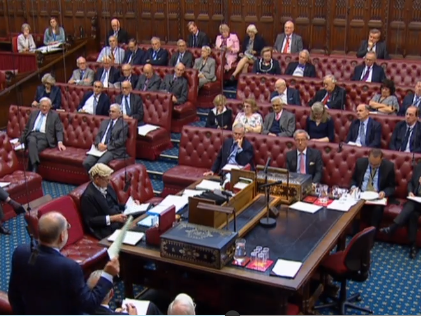
The Data Protection Bill will go through Parliament without an amendment calling for a second Leveson inquiry, as peers backed down after weeks of ping-ponging between the two Houses.
Labour MPs and peers had pushed for an amendment to the bill which would have meant an inquiry being established into allegations of data protection breaches committed by or on behalf of national news publishers and other media organisations.
However the issue was voted down by MPs twice in the past three weeks and peers today agreed not to challenge it further.
Culture Secretary Matt Hancock tweeted that he was “delighted” the Data Protection Bill has been passed by Parliament and confirmed that, subject to Royal Assent, it will come into force on Friday.
Lord Keen told peers today that there is no amnesty for the press through the halting the Leveson inquiry, adding: “What we are doing, however, is providing the institutions we need for the challenges of the future.”
Hancock last week added a series of new amendments to the Data Protection Bill including a report into the “use and effectiveness” of the Independent Press Standards Organisation’s compulsory low-cost arbitration scheme to come before Parliament at least every three years.
He also widened the scope of the Information Commissioner’s review into media compliance with the new data protection law, giving her office stronger powers to compel evidence, and said the review would be held every five years.
Lord Keen said: “When these amendments are viewed alongside the improvements IPSO has already made to its processes and procedure, I am confident that this country now has the most robust system of redress for press intrusion that it has ever had and it has achieved it without resorting to state regulation.”
Keen warned peers that GDPR regulation would come into effect in the UK at midnight on Friday whether or not the Government is prepared.
He said: “If we do not pass implementing legislation in the next three days, medical research will ground to a halt, the administration of justice will stutter as chambers work out whether it is preferable to breach court disclosure rules or data protection law, and sectoral regulators will have to tip off the people that they’re actually investigating.
“My Lords, it would potentially be chaotic and it would be this House who will be held responsible.”
He added: “The damage done by not passing this bill today would be irreversible and the only winner would be data protection lawyers.”
Lord McNally initially told peers he wanted to move a new amendment which would mean the review into the workings of IPSO’s compulsory arbitration scheme would be led not by a politician – namely, the Culture Secretary – but by independent body the Press Recognition Panel.
“It would have the added advantage of being able to assess the effectiveness of dispute resolution procedures guided by the criteria set out by the Leveson report,” he said.
However McNally dropped his motion before it went to a vote after hearing other peers speak, saying “we’ve never wanted to stop this bill becoming law”.
McNally acknowledged the Salisbury Convention, under which the House of Lords normally will not oppose the second or third reading of any Government bill which was in the party’s election manifesto.
But he said: “It does not protect that bill from scrutiny or amendment nor is there anything wrong in asking the Commons more than once to consider this.
“The House of Lords must retain its right to say no because once it loses that right it becomes a debating society not a House of Parliament.”
Baroness Hollins, whose amendment pushing for Leveson Two to take place was last week rejected in the Commons, said she reluctantly accepted the MPs’ decision.
She added that some MPs’ representations about her amendment had been disappointing, saying: “Some speakers [in the Commons] remained in denial about the continuing bad behaviour of some elements of the national media.”
Hollins also revealed she had been approached last week by some MPs who had voted with the Government to ask her not to give up on Leveson Two.
Lord Lester condemned the continuing attempts to add amendments which would be “unnecessary regulation” or “contrary to the freedom of speech”.
And Lord Cormack said passing the Data Protection Bill today did not mean the issues raised could not be returned to again.
Two weeks ago Labour dropped a Section 40-style cost amendment, which they had also wanted to add to the Data Protection Bill, after the Scottish National Party withdrew its support ahead of the vote.
The amendment would have forced newspapers not signed up to a Royal Charter regulator – currently only Impress – to pay both sides’ legal costs in data disputes, win or lose.
Picture: Parliament Live TV
Email pged@pressgazette.co.uk to point out mistakes, provide story tips or send in a letter for publication on our "Letters Page" blog
